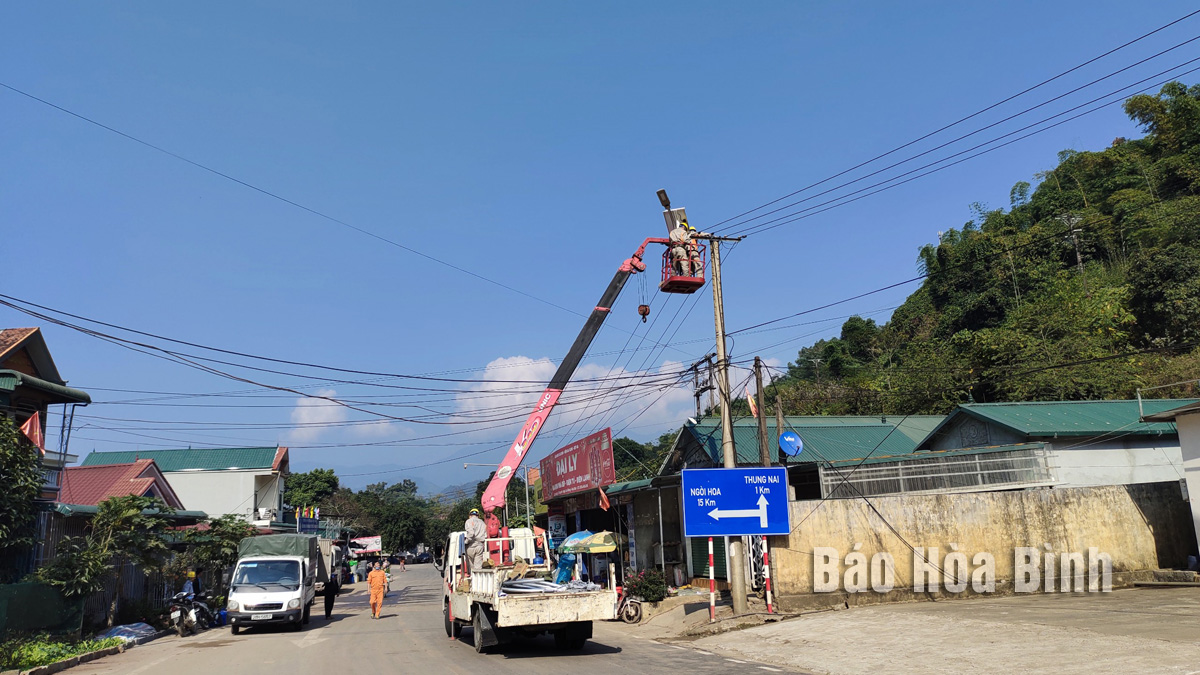
In 2023, Cao Phong district sets a goal: focusing on directing and trying to turn Thung Nai into a new rural commune. Determining to reach the finish line on schedule, at this time, the Party Committee, the appropriate authorities and the people in the commune are making their efforts to complete the criteria.
Hoa Binh Electricity Company coordinated with the Party Committee and the authorities of Thung Nai commune (Cao Phong) to build a road to light up the countryside, creating a bright - green - clean - beautiful appearance for the locality.
Coming to Thung Nai today, people can clearly feel the "change” in this land. The clearest evidence is that transportation has become convenient, people's lives have improved, and infrastructure has been invested in and built. …
Taking advantage of their free time, the people in Moi Hamlet focus on pruning trees and cleaning roads to create a green - clean - beautiful landscape. Mr. Ha Minh Tam, a resident of the hamlet, says: Since starting to build the new rural area, the environmental landscape, the spiritual and material life of my family as well as the people in the hamlet have markedly improved. Therefore, no one reminded anyone, everyone has voluntarily and actively carried out the tasks with the hope of soon bringing the commune to the destination of the new rural area.
Not only in Moi hamlet, in Nai hamlet, Tien hamlet... people all join forces and unanimously maintain and improve the quality of completed criteria such as traffic, irrigation, security and order... In most hamlets Focus on beautifying roads and cultural buildings to create highlights for residential areas.
Aiming to reach the goal of the new rural area at the end of the year, over the past time, Thung Nai has proactively reviewed and evaluated the level of completing the criteria, built the detailed plans and specific solutions to implement, thereby they have been focusing on propagandizing and mobilizing the people to participate.
According to Mr. Bui Van Tuyen, the Vice Chairman of Thung Nai Commune’s People's Committee, by October, the commune still has 2 unmet targets, which is criterion No. 6 on the cultural facilities (not competting the component target: the the sports stadium ensuring the prescribed area to serve the cultural and sports activities of the entire commune); Criterion No. 17 on the environment and food safety (3 component criteria have not been met:the proportion of domestic solid waste and non-hazardous solid waste in the area collected and treated according to the regulations; the proportion of used pesticide packaging and medical solid waste collected and treated to meet the environmental protection requirements; the proportion of plastic waste generated in the area is collected, reused and. processed and handled according to the regulations).
Dedicated to perfecting the criteria, in early November, with the attention and support of the People's Committee of Cao Phong district, Thung Nai commune signed a contract with Hoa Binh Urban Environment joint Stock Company to collect waste in the area. Thereby, they initially completed the component criteria of criterion No. 17 on the environment and food safety. Regarding the expansion of the sports field, ensuring the area according to the regulations, implementing the district's orientation, the commune is developing implementation plans, trying to complete the criteria, bringing Thung Nai to the finish line on the set roadmap.
The Vice Chairman of the Communal People's Committee, Mr. Bui Van Tuyen acknowledges: In order to achieve the current results, in addition to the close leadership and direction of the District’s Party Committee, the District’s People's Committee, and directly the relevant professional departments, it must also be mentioned the active participation of the officials, the party members and the local people, the help of the mass organizations: the Women's Union, the Youth Communist Union, the Communal Farmers' Union... Through the practical and specific work such as eliminating mixed gardens; building, consolidating and upgrading the rural roads; Mobilizing the people to donate land to build roads and welfare projects...
The Standing Board of the Hoa Binh provincial Party Committee has agreed in principle on a proposal by the Standing Board of the Party Committee of Hoa Binh city to gather feedback on the city’s 1:2000 zoning plan, which forms part of its broader urban development strategy.
Hoa Binh province has made notable progress in public administration reform and digital government development, with the satisfaction index among citizens and businesses reaching over 84%, according to recent government evaluations.
Thanks to great efforts by local authorities in recent times, the governance and public administration performance of Mai Chau district has been significantly improved.
In the afternoon of June 6, the Party Committee, the People's Council, the People's Committee and the Fatherland Front of Lac Son district solemnly held a meeting to celebrate the 139th anniversary of the district's founding (1886–2025) and the 79th anniversary of the establishment of the district's Party Committee (1946–2025). There was the attendance of Mr. Bui Van Thang, the Vice Chairman of the Provincial People's Council; Mr. Quach Tat Liem, the Vice Chairman of the Provincial People's Committee; Ms. Dang Bich Ngoc, the Deputy Head of the National Assembly Delegation of the province; as well as the former leaders of the province and district through various periods, who are the natives of the district.
Implementing the Politburo’s Resolution No. 57-NQ/TW on breakthroughs in science – technology, innovation, and digital transformation is a golden opportunity for the northern mountainous province of Hoa Binh to renew growth model, improve competitive edge and shorten digital gap.
Resolution 57-NQ/TW, issued by the Politburo on December 22, 2024, identifies sci-tech, innovation, and digital transformation as strategic breakthroughs to build a developed and prosperous nation. In Hoa Binh province, this spirit is not just a slogan, it’s being put into action through concrete initiatives that form a "new development triangle”: digital citizenship, digital economy, and digital administration.



